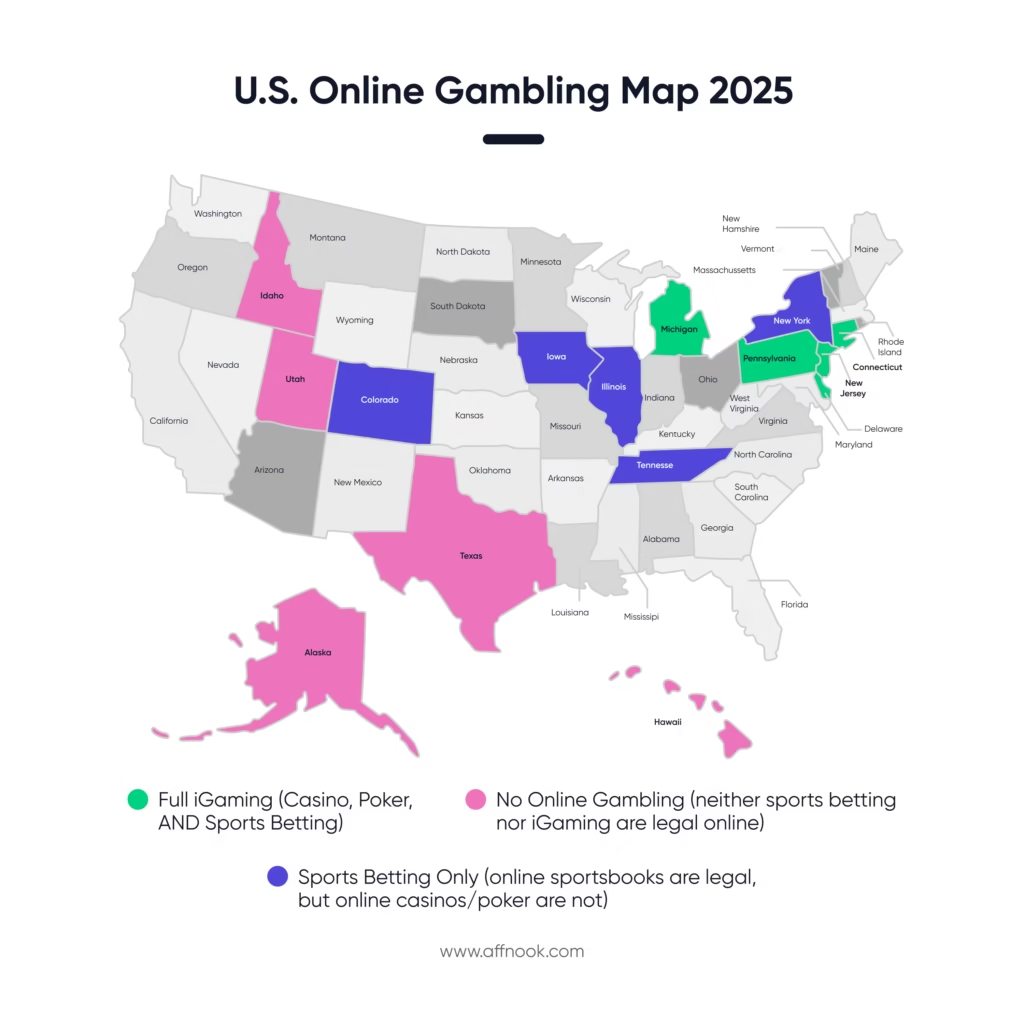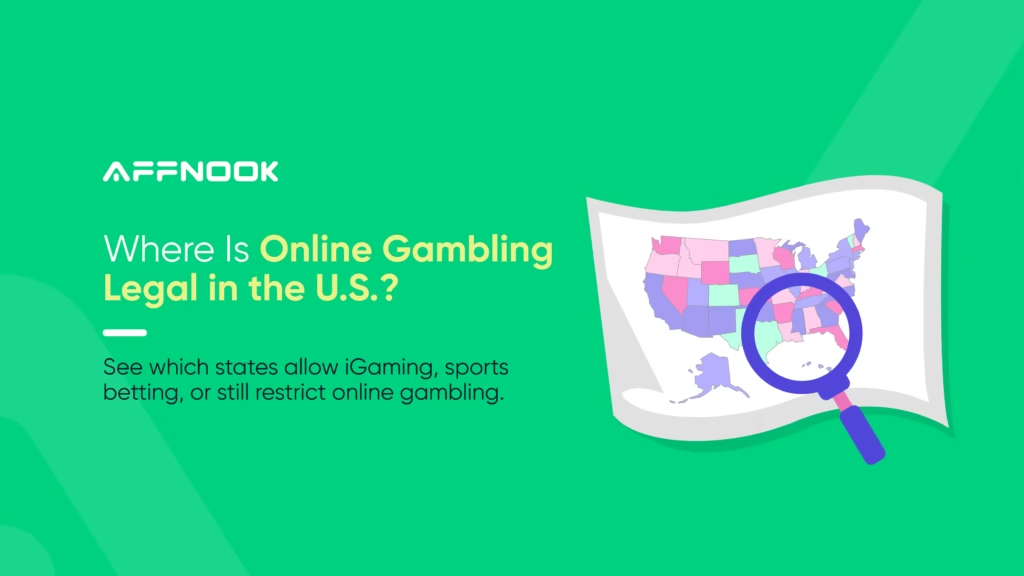Imagine packing your bags for a cross-country road trip in the USA. You’ve got your snacks, playlists, and pit stops planned.
But if you’re an iGaming enthusiast, there’s one more thing to check before you cross state lines: Can you legally place an online bet where you’re headed?
That single question — what states allow online gambling? — is shaping the future of entertainment, tourism, and even state tax revenue. The U.S. gambling market is booming, but here’s the catch: Gambling laws are different in every state, and no two are exactly alike.
According to Statista, the U.S. gambling market is set to reach $121.29 billion in 2025 and grow to $147.88 billion by 2029 at a CAGR of 5.08%. With this rapid growth, players and operators need a clear map of where online gambling is legal, restricted, or banned.
This blog will help you navigate that tricky map. You will explore which states allow online casinos, poker, and sports betting, why some states hold back, and the challenges faced by the iGaming operators.
Why Online Gambling Laws Differ Across States
One of the most confusing things about the USA’s gambling laws is that there’s no single nationwide rulebook. Unlike countries where gambling is regulated at the federal level, in the USA, each state has the authority to decide whether online gambling is legal, what types are permitted, and how it’s regulated.
So, what causes this patchwork of laws? Here are the main factors:
- State Autonomy
Each state sets its own priorities. For example, Nevada has long embraced gambling as part of its culture and economy, while Utah has written a complete ban on gambling into its constitution. What works in one state simply doesn’t fly in another. - Different Views on Risk vs. Reward
Some states see online gambling as a chance to boost tax revenue, attract investment, and create jobs. Others worry more about problem gambling, fraud, or the social costs of easy access. - Pressure from Local Stakeholders
Tribal casinos, lotteries, and land-based operators often have a strong influence. In some cases, they push for online expansion. In others, they fight it, fearing competition will cut into their profits. - Cultural and Religious Beliefs
Gambling is widely accepted in places like New Jersey or Michigan, but seen as morally harmful in states like Utah and Hawaii. These cultural differences sometimes shape laws more than economics.
The result? A fragmented map where New Jersey thrives with online casinos and poker, New York only allows sports betting, and Utah bans it all. For players and operators, it means constantly checking the rulebook as soon as you cross state lines.
What States Allow Online Gambling? A State-by-State Look
Here’s the part you’ve been waiting for. Let’s break it down by category: states with full online gambling (casinos, poker, and sports betting, dice gambling), states with sports betting only, and those where online gambling remains illegal.
States with Full Online Gambling
These states allow sports betting, online casinos, and online poker.
- New Jersey – A pioneer, home to Atlantic City, legalized online casinos and poker in 2013.
- Michigan – Offers sports betting, poker, and online casinos.
- Pennsylvania – One of the largest markets, with sports betting, poker, and casinos.
- Delaware – Small but mighty; legalized online poker and casino gaming in 2012.
- Connecticut – Offers casinos and sports betting through tribal partnerships.
States with Sports Betting Only
Sports betting has spread faster than casinos or poker. These states allow online sportsbooks but not iGaming:
- New York – Launched online sports betting in 2022; became one of the largest markets overnight.
- Illinois – Legal sports betting with both online and retail operators.
- Colorado – Online sports betting is booming thanks to a competitive marketplace.
- Tennessee – Online-only sports betting, no physical casinos.
- Virginia – Sports betting only, no online casinos yet.
States with No Online Gambling
Some states keep the doors shut completely:
- Utah – Strictly prohibits all forms of gambling.
- Hawaii – No casinos, no lottery, no sports betting.
- Idaho – No signs of legalization in the near future.
- Texas – Sports betting discussions are ongoing, but not yet legal.
- South Carolina – Still resistant to online gambling.

Why Some States Embrace Online Gambling
For some states, online gambling isn’t just about entertainment — it’s about economics, modernization, and staying competitive. When states like New Jersey, Michigan, and Pennsylvania decided to legalize iGaming, their goal wasn’t only to provide residents with more gaming options but also to unlock massive streams of tax revenue.
That’s why, when people ask what states allow online gambling, the answer often includes those that see the bigger financial and social benefits.
- Big Money from Online Play: Online casinos, poker, and sports betting bring in huge sums of money every year. Take Michigan, for instance, its iGaming market has exploded, hitting a record $2.3 billion in online gambling revenue in 2023. That isn’t just profit for the platform; it also means substantial tax revenue flowing back into the state.
- A Growing Industry
The gambling market in the U.S. is booming. Statista says it will hit $121.29 billion in 2025 and grow to $147.88 billion by 2029. With growth like this, it’s easy to see why more states are rethinking their stance on online gambling. - Protecting Players
Legal online gambling means stricter rules, safer payments, and better tools for responsible gambling. This protects people more than shady offshore sites, which often have no rules at all. - Keeping Up with Neighbors
Once one state makes money from online gambling, nearby states don’t want to miss out. That’s why, after New Jersey showed how profitable it could be, Pennsylvania and Michigan followed quickly. - Boosting Tourism and Entertainment
For states like New Jersey and Nevada, online gambling adds another layer to their already famous casino scenes. It helps keep them attractive to both locals and tourists in a digital-first world.
In short, states that embrace online gambling see it as a win-win: more money, more jobs, safer play for users, and a chance to modernize entertainment. And as the iGaming industry keeps growing, the list of states that allow online gambling. will only get longer.
Key Challenges for Operators and Brands
Even in states where online gambling is legal, operators don’t have it easy. Running an iGaming business in the U.S. comes with a unique set of challenges:
- High Taxes
Some states have sky-high tax rates on gambling revenue. For example, New York charges operators a 51% tax on sports betting revenue, one of the highest rates in the country. While players enjoy the games, operators often struggle to keep profits healthy under these conditions. - Expensive Licenses
Getting a license isn’t cheap. Depending on the state, application fees, regulatory costs, and ongoing renewals can run into the millions. This makes it harder for smaller companies to compete against big, well-funded brands. - Complex Rules in Each State
Every state that legalizes online gambling writes its own rulebook. That means what’s allowed in New Jersey might not be allowed in Michigan. Operators often need to customize their platforms and compliance systems for each market, which costs both time and money. - Fierce Competition
In states like New Jersey or Pennsylvania, dozens of operators are already fighting for the same players. That means new entrants need strong marketing campaigns, attractive bonuses, and unique features just to get noticed. - Responsible Gambling Requirements
States also require operators to provide tools for safe play. These include deposit limits, self-exclusion options, and warnings about problem gambling. While these are crucial for player protection, they add more operational responsibilities for the companies. - Technology and Security Demands
Online gambling platforms must guarantee secure payments, prevent fraud, and protect user data. Any breach can damage trust instantly — and with real money on the line, players expect airtight systems.
Why Many States Say “No” to Online Gambling?
If online gambling brings in so much money, why don’t all states allow it? That’s the big question many people ask when looking at the U.S. gambling map. While some states see iGaming as a golden opportunity, others remain firmly against it. Here’s why:
- Cultural and Religious Beliefs
In states like Utah and Hawaii, gambling isn’t just restricted — it’s completely banned. Utah has gambling written into its constitution as illegal, largely due to strong religious and cultural values. For these states, the debate isn’t about money; it’s about sticking to deeply held beliefs. - Fear of Problem Gambling
Lawmakers in many states worry that legal online gambling could lead to higher rates of addiction, financial problems, and social harm. Even with responsible gaming tools, some still believe the risks outweigh the rewards. - Political Pressure and Lobbying
Traditional casinos, tribal groups, or state lotteries sometimes push back against online gambling. They fear it might cut into their profits. In states like Florida or California, these powerful groups have slowed down legalization efforts. - Uncertain Financial Impact
Not every state is convinced that online gambling will bring in steady revenue. Some lawmakers worry about regulation costs, enforcement challenges, or market instability. To them, it feels safer to avoid legalization altogether. - Moral Opposition
Beyond religion, there’s a general belief in some regions that gambling promotes unhealthy behavior, especially when it’s accessible 24/7 from a smartphone. For these states, no amount of revenue is worth the social risks.
The result is a patchwork map: some states welcome online gambling and generate billions in revenue, while others maintain strict prohibitions, making the question of which states allow online gambling a moving target that can change year by year.
Final Thoughts
So, what states allow online gambling? The answer is constantly changing. Right now, only a handful of states offer full online casinos and poker, while sports betting is legal in over 30 states. The rest of the map remains cautious or outright opposed.
For players, it’s essential to know the rules before logging in. For operators, the U.S. remains a land of opportunity — but only for those willing to navigate the state-by-state puzzle. One thing is certain: the USA online gambling market is only getting bigger. And as the industry grows, the question of what states allow online gambling — and where marketing online gambling efforts can be most effective — will only become louder
Help Section
What States Allow Online Gambling in 2025?
Yes, several U.S. states currently allow online gambling, but the scope differs by jurisdiction. As of 2025, states like New Jersey, Pennsylvania, Michigan, Delaware, and West Virginia permit online casinos, poker, and sports betting. Others, including New York and Illinois, allow online sports betting only, while states such as Utah and Hawaii have complete bans on gambling. For iGaming operators and brands, this means market entry depends on targeting states with legalized frameworks and active licensing programs.
Which U.S. States Regulate Online Casinos vs. Sports Betting?
The regulation of online casinos and sports betting is not uniform.
- Online casinos & poker are legal in: New Jersey, Pennsylvania, Michigan, West Virginia, and Delaware.
Sports betting only states include: New York, Arizona, Colorado, and Illinois.
Understanding this distinction is critical for iGaming brands because licensing, taxation, and compliance requirements differ across these verticals.
Why Do Online Gambling Laws Differ Between States?
Online gambling laws differ because the U.S. operates on a state-by-state regulatory model rather than a federal framework. Each state legislature decides whether to legalize gambling, the types permitted, and which regulatory authority oversees operations. For example, Nevada is known for sports betting and poker, but it restricts online casinos, while New Jersey is the most comprehensive iGaming hub, covering casinos, poker, and sportsbooks. For international operators, this patchwork means adapting strategies to localized laws and tax regimes.
What States Are Most Profitable for iGaming Operators?
Based on market size and player activity, the most profitable states for iGaming operators are:
- New Jersey – Mature iGaming ecosystem with high monthly GGR.
- Michigan – Rapid growth in both sports betting and online casinos.
- Pennsylvania – Strong online casino revenues and player engagement.
- New York – The largest sports betting market, though casino gaming remains restricted online.
Operators should evaluate tax rates, licensing costs, and player demand to determine ROI in each state.
How Can International iGaming Brands Enter U.S. Regulated Gambling Markets?
International operators can enter U.S. markets by:
- Partnering with local casinos or licensed entities (a legal requirement in most states).
- Applying for state-specific licenses via regulatory boards like the New Jersey DGE or the Pennsylvania Gaming Control Board.
- Leveraging affiliate marketing to build brand presence in regulated states.
- Adapting to geolocation compliance tools that restrict players outside legal borders.
This approach ensures brands comply with local laws while tapping into the growing U.S. online gambling market.




